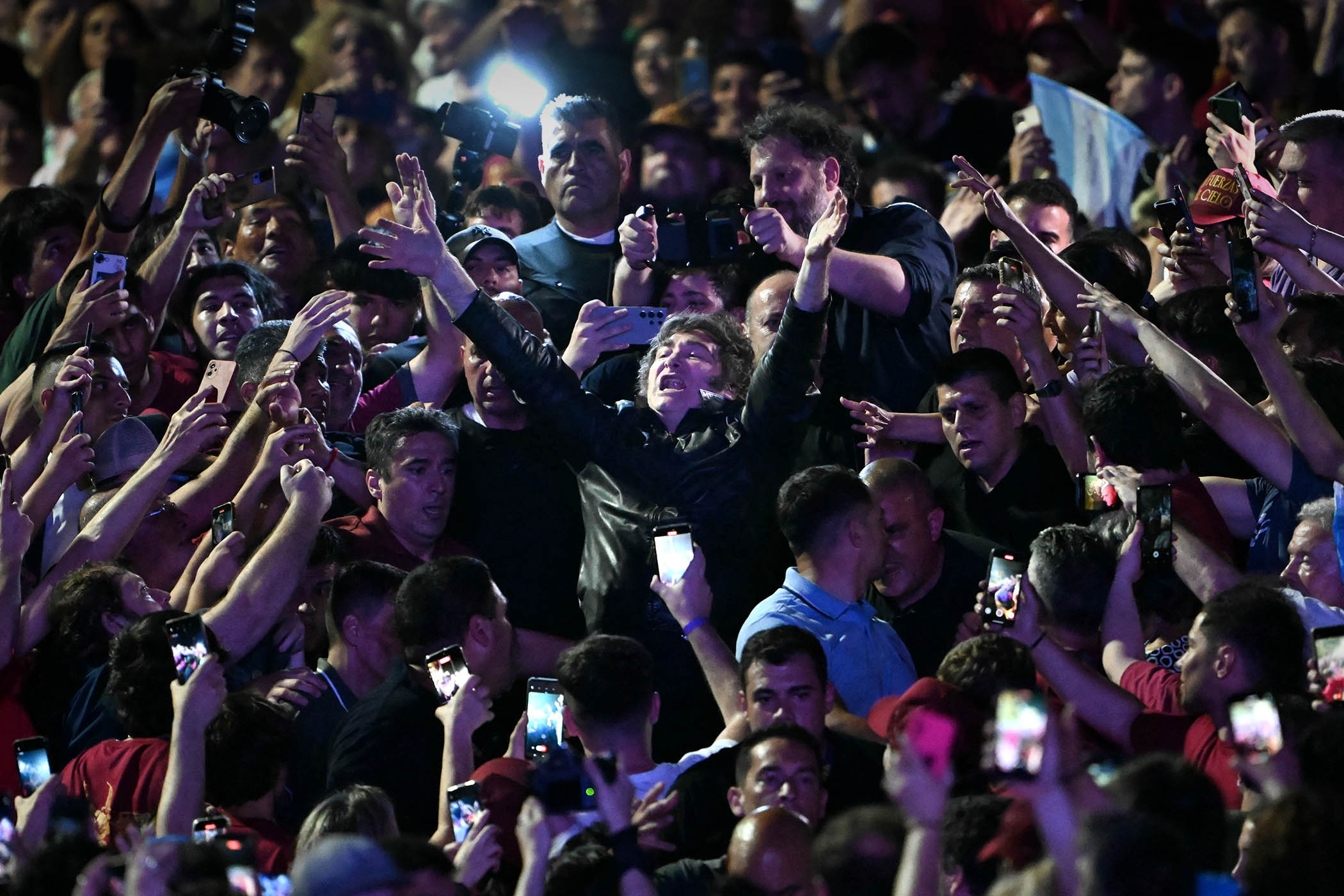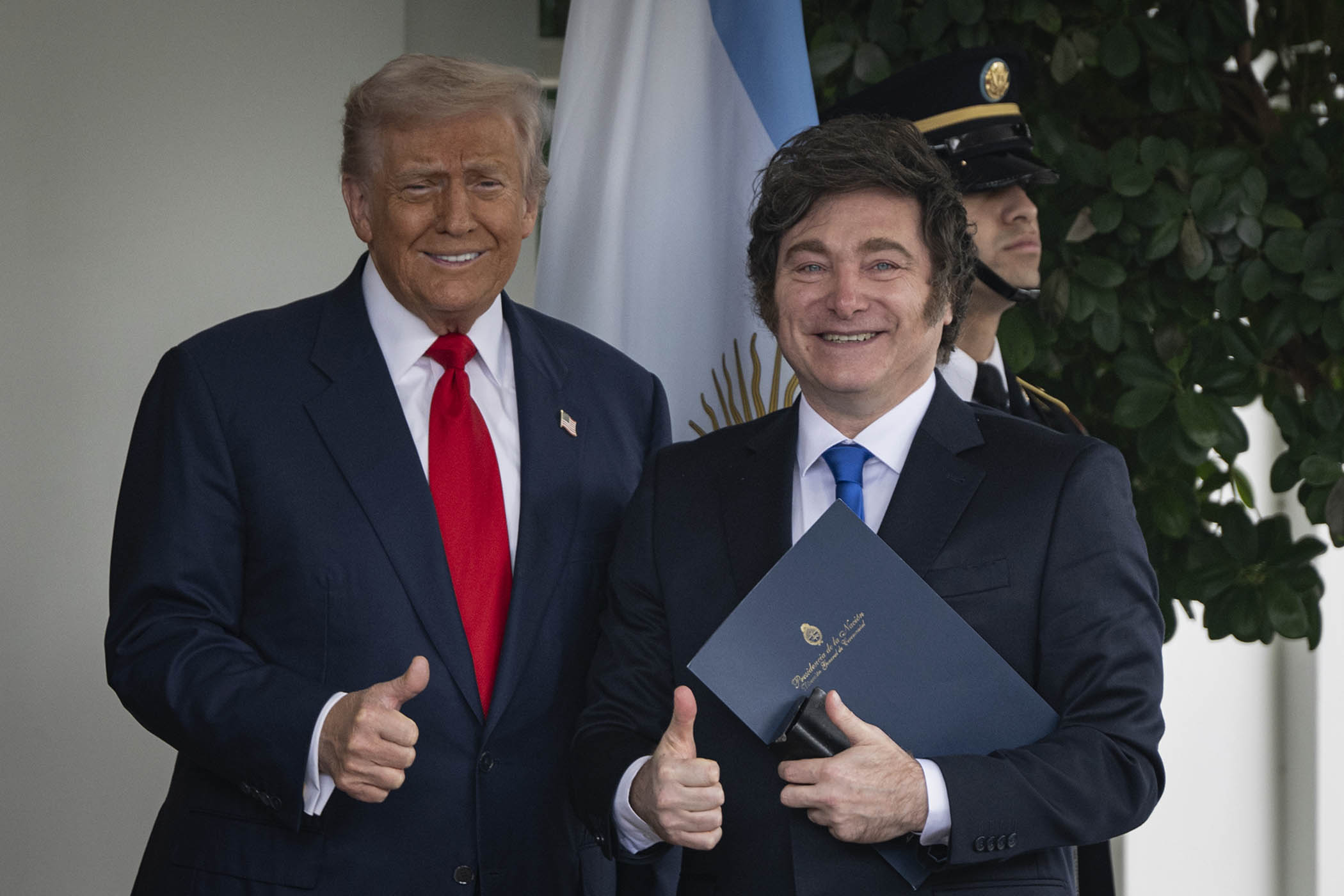In Argentina, the president, Javier Milei, won by pledging to clean up the swamp. Now, before the midterm elections on Sunday, he is sinking into it himself.
The slogan for a campaign video recently released by Milei’s party, La Libertad Avanza (LLA), read: “If you want to vote for the redhead, tick the bald one.” In Spanish, at least, it rhymed – “Para votar al Colorado, marcá al Pelado” – but its main aim was to clarify a confusing ballot. Voters were not to choose Diego Santilli – the redhead – but José Luis Espert, the bald man who had headed the list before withdrawing, too late for the ballot papers that carry his image to be reprinted with that of his replacement Santilli.
Espert had stepped aside after a scandal revealed he had been paid by an Argentinian businessman facing a US prosecution for charges including drug trafficking.
The farcical episode underscored the political test facing Milei’s libertarian government since it took office in December 2023. Can he persuade voters that the sacrifices he has forced on them to curb inflation have been worth it?
Milei, a TV pundit and economist who shot to power amid a political and economic crisis during a year when annual inflation surpassed 200%, pledged not only to fix the economy but to overturn the political caste that had ruled the country for decades.
The legitimacy of his promises began to waver several months ago, when LLA faced a series of corruption scandals that implicated its main candidates and officials, including Milei’s inner circle.
A leak to the press of audio recordings outlining an alleged bribery scheme linked to Karina Milei – the president’s sister, who serves as his general secretary and is the person he relies on most – was the first blow that shook the widely held belief held that the Mileis were, in fact, different from their predecessors.
Just weeks after former president Cristina Fernández de Kirchner began her six-year sentence under house arrest for fraudulent administration – a conviction applauded by Javier Milei and his allies – the government faced fresh allegations involving top officials accused of retaining a percentage of medical contracts signed by the disabilities agency.
Related articles:
Meanwhile, disabled communities protested outside Congress, demanding the reversal of a presidential veto that had halted increased funding for disability care, directly affecting access of families to essential support.
After the audio recording leak, LLA lost the provincial midterms in Buenos Aires province, the country’s largest jurisdiction, by more than 13 percentage points.
Newsletters
Choose the newsletters you want to receive
View more
For information about how The Observer protects your data, read our Privacy Policy
And as the government sought to build relations with the US while pursuing a bailout that could stabilise the plummeting economy before the national midterms, another controversy emerged: local media reported that Espert, who had topped the national ballot for LLA in Buenos Aires province, had received thousands of dollars from Fred Machado, an Argentinian businessman facing extradition on charges relating to cocaine trafficking, which he denies, and a $550m Ponzi scheme in the US.
“It’s clear to me that this is a political operation,” said Milei during the scandal. “I know how these things work.”
However, after struggling to deny the allegations amid new leaks that increasingly tied him to Machado, Espert withdrew his candidacy.
For voters such as Adrián Manuel Agüero, a 50-year-old tour guide from Salta in northern Argentina, the scandals have been the final straw. He said he voted for Milei “out of hope”, despite him making “the biggest adjustment in the history of Argentina”. Back in 2023, Agüero felt it was necessary.
But as time passed, he realised the adjustments were sweeping and that the public sector had shrunk dramatically. The cancellation of vital public works to improve the roads he frequently travels on alarmed him.
And when he heard about the corruption cases, he felt disillusioned. “I lost all trust,” he said. “The worst part is that they destroyed my hopes.” He has not decided who he will vote for in the midterms, but will not vote for a libertarian on the ballot this time.
“We’re approaching the end of the political caste,” said Milei in August 2023, on the night he won the primary elections – an unexpected victory for a movement that had barely been in the public sphere for two years.
Battling political elites, as he described them, became a central pledge, as many – Agüero, among them – believed Argentina’s chronic instability was rooted in a corrupt system sustained by traditional politics.
“They promised to be different,” said Oscar Agost Carreño, who heads PRO Córdoba, a rightwing party allied with Milei. “But they ended up hiding, blaming political operations and journalists. Corruption scandals, especially during economic crises, hit voters hard.”
Although Milei has delivered on his main economic promise – to reduce inflation – it has come at a high cost. His government has slashed budgets across pensions, healthcare, science, education and cultural programmes, triggering a collapse in buying power and deepening hardship for low- and middle-income families.
“The main loss in support for Milei doesn’t come specifically from corruption,” said Juan Courel, a political consultant. “It’s the economic situation – it weakens his image, his ability to control the conversation and his legitimacy in handling political crises. Expectations are crumbling; people no longer feel this recipe will benefit their pockets.”
Polls reflect this disaffection. Milei’s disapproval rate reached almost 54% in September – up 10 points since June, the period marked by corruption revelations, according to an AtlasIntel survey for Bloomberg. Meanwhile, his approval rating – now at 42% – is continuing to slide.
Courel believes countering the effects of these controversies will be hard. “They will probably bear the scars for a while, and new ones will appear,” he said. “You can’t wash them away with discourse, propaganda and campaigns – they would require political decisions made with determination.”
Agost Carreño, who initially backed Milei, said the government had “detonated” the relationship with lawmakers. “They negotiated and were more accessible,” he said. But, over time, the libertarians sought to build provincial power, breaking agreements with local authorities, some of them longstanding.
As voters go to the polls on Sunday, Milei faces his administration’s biggest challenge; despite his promises to disrupt traditional politics, to date, its playbook seems to be enduring on his watch.
Photograph by Luis Robayo/AFP via Getty Images


